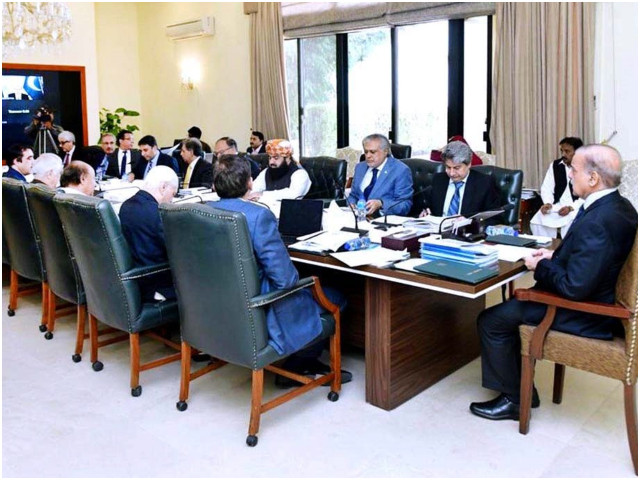
The National Economic Council (NEC) on Tuesday approved a “fiscally irresponsible” federal development budget of Rs950 billion out of which 46% allocations have been given to the newly-included 311 schemes, indicating the government’s election priorities.
Headed by Prime Minister Shehbaz Sharif, the NEC -- the constitutional body mandated to approve the development and national economic plans -- approved a total Rs2.509 trillion national outlay including allocations proposed by the provinces.
However, an in-depth review of the Rs950 billion worth Public Sector Development Programme (PSDP) disclosed that 46% of the proposed budget has been given to the new 311 schemes. This is one of the highest-ever ratios that will completely put the country’s development spending on the wrong track.
For the ongoing 871 schemes, only Rs516 billion have been allocated, which will severely impact the work and push their completion period far behind the schedules. This will also increase the cost of completion due to uncontrolled inflation in the country.
An allocation of Rs80 billion has been made for the prime minister’s initiatives and another Rs90 billion for the parliamentarians’ schemes.
Compared to this, a meagre sum of Rs200 million has been proposed for the Rs2 trillion strategically important Main Line-1 (ML-I) project of China-Pakistan Economic Corridor.
This indicates that the government does not have a plan to start work on this $11 billion CPEC project in the next fiscal year too. The project is already five years behind schedule.
However, Planning Minister Ahsan Iqbal claimed that adequate allocations have been made for the CPEC projects.
In yet another move that shows how fiscally irresponsible the budget has been prepared, 135 projects are included in proposed PSDP 2023-24 whose approval has not yet been secured.
Iqbal said the NEC decided that all those projects will be dropped from the PSDP whose administrative approvals will remain pending after June 29.
The International Monetary Fund will not endorse any budget that is in breach of its guidelines seeking a fiscally responsible and sustainable budget.
The NEC approved Rs2.509 trillion cumulative national development outlay for spending by the federal government and the four provinces. The Rs2.5 trillion allocation was Rs90 billion or 4% higher than this fiscal year.
The minister said that the total outlay will cross Rs3 trillion once the new governments in Punjab and Khyber-Pakhtunkhwa are formed after the next general elections. The interim governments have given development budgets for four months, he added.
The four provinces will spend Rs1.559 trillion from their own resources. Punjab has proposed a Rs426 billion development budget for just four months, which is significantly lower than this year’s Rs702 billion revised estimates.
Sindh has allocated Rs617 billion budget compared to Rs442 billion of this fiscal year, showing a huge increase of 40% ahead of elections.
Khyber-Pakhtunkhwa allocated Rs268 billion for the development spending for four months compared to this year’s revised figure of Rs340 billion.
The Balochistan government also proposed a Rs248 billion development budget for the next fiscal year, showing an increase of 27% over this fiscal year’s revised estimates.
The parliamentarians’ schemes have been given Rs90 billion compared to Rs111 billion of this fiscal year.
The NEC also approved Rs80 billion worth of various initiatives of PM Shehbaz. These included Prime Minister's Initiatives for Solar Tube Wells, Prime Minister's Youth Programme for Small Loans, Pakistan Endowment Fund for Education, Prime Minister's Initiatives Support for IT Start-ups & Venture Capital, Prime Minister's Initiatives for Women Empowerment, Prime Minister’s Laptop Scheme, Prime Minister’s Green Revolution 2.0, Prime Minister’s Youth Skill Development and Prime Minister’s Institute of Sports.
All these initiatives appeared aiming at the youth voters ahead of the next general elections.
Besides, Iqbal said that the government is going to launch the National Programme for Prevention of Diabetes to control the wide-spreading disease in the country.
The government is also going to launch the National Multi-Sectoral Nutrition Programme and establishment of Governance Innovation Lab.
The planning minister said that the government would distribute 22,000 scooters among the women under the Women on Wheels initiative.
A Rs25 billion fund is being launched for addressing the crisis of over 20 million out-of-school children, the planning minister said, adding that work on the Flood Protection Sector Programme will also begin in the next fiscal year.
It seems that the coalition partners have also prevailed upon the government. As against the earlier allocated funds of Rs98 billion, the NEC approved Rs161 billion for the JUI-controlled National Highway Authority.
A total of 1,182 schemes have been included in the next year’s PSDP. There are 348 projects worth Rs428 billion that have national significance. About 168 projects of Punjab are included in the PSDP and Rs79 billion are given for the next fiscal year.
About 120 schemes of Sindh are also included and an amount of Rs80 billion was given for the next fiscal year. As many as 116 projects of K-P are included in the PSDP and an amount of Rs62 billion has been allocated. Similarly, 245 projects of Balochistan are part of the new PSDP and Rs137 billion are allocated for work in the next fiscal year.
The coalition government also approved Rs4.4 trillion worth of projects from April 2022 to March 2023.
The planning minister said that the NEC also endorsed the energy conservation plan that binds the provinces to close the markets by 8pm starting July 1. “We hope that provincial governments will implement the energy conservation package,” Iqbal maintained.
Provincial governments were urged to implement an energy conservation programme under which shops and commercial centres would close by 8pm, according to the Prime Minister's Office.
Participants at the NEC meeting were informed that implementing the plan would result in a $1 billion reduction in fuel import bills annually, Iqbal said.
The planning minister noted that Pakistan's economy would remain vulnerable if fossil fuels continued to be used. He said it was decided that in future no new imported-fuel-based power projects will be approved.
Energy has become a significant challenge for Pakistan due to price volatility in the global markets, he said, adding that the government was hoping to implement the energy conservation package that was not adopted by provinces last year.



1723278472-0/BeFunky-collage-(4)1723278472-0-165x106.webp)



1732525382-0/Express-Tribune-(10)1732525382-0-270x192.webp)

1732523977-0/Copy-of-Untitled-(82)1732523977-0-270x192.webp)
1732520846-0/Copy-of-Untitled-(79)1732520846-0-270x192.webp)
1732515558-0/Copy-of-Untitled-(76)1732515558-0-270x192.webp)






COMMENTS (1)
Comments are moderated and generally will be posted if they are on-topic and not abusive.
For more information, please see our Comments FAQ